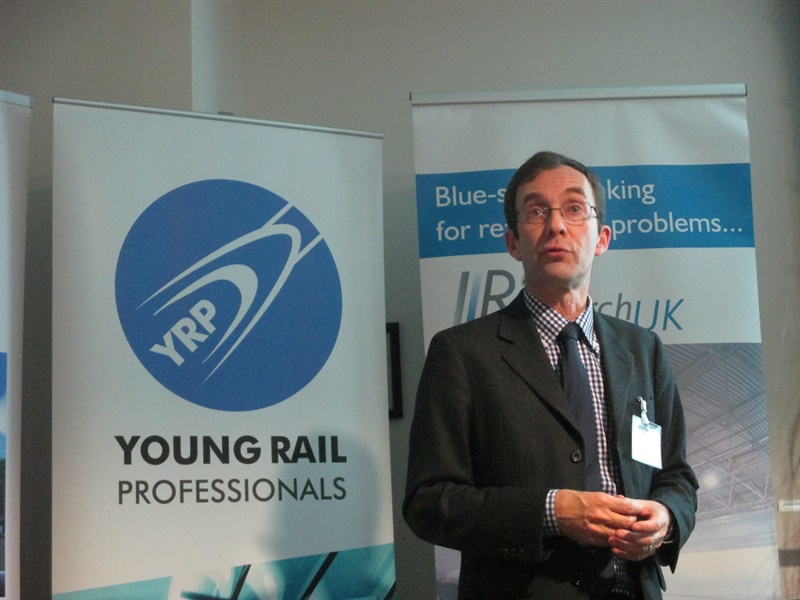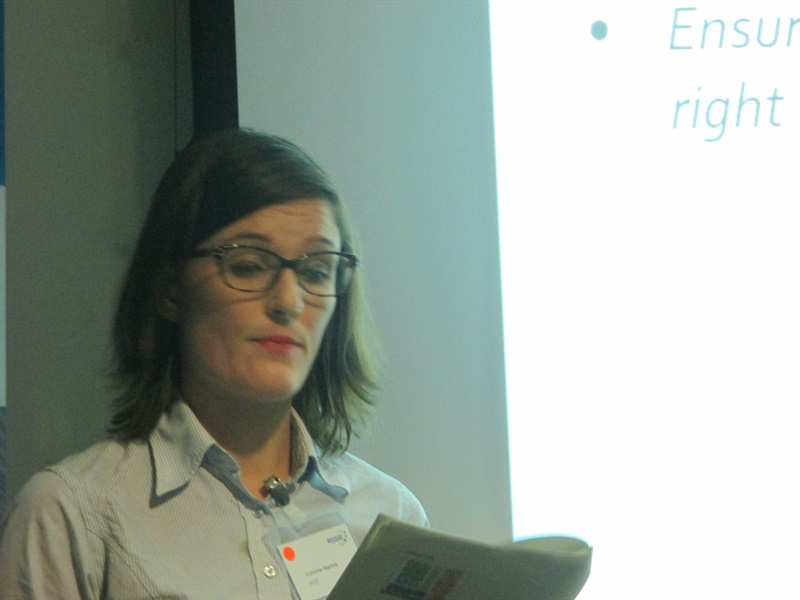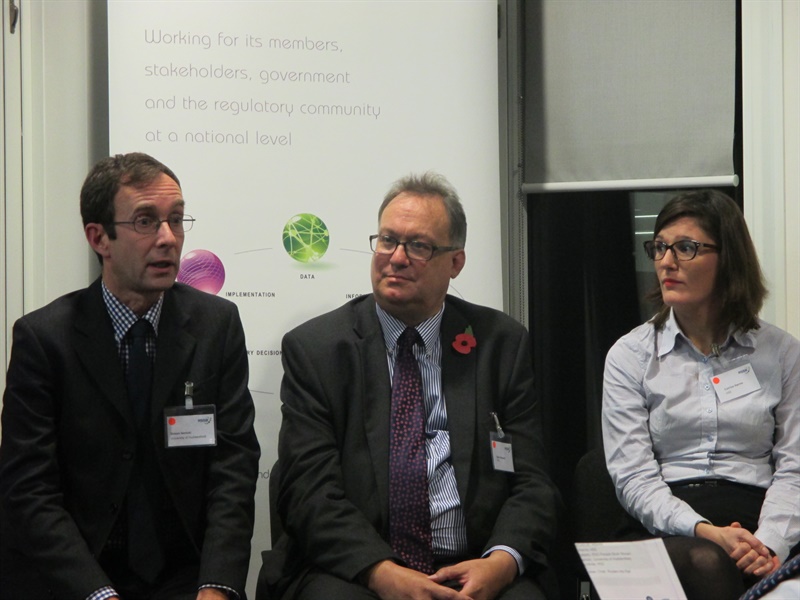30.10.14
Routes into Rail: Changing perceptions
Leadership in rail and perceptions of the industry were the key topics at yesterday’s Routes into Rail event.
Gary Cooper, director of operations and engineering at ATOC, opened the event and highlighted that the industry needs to grow and develop the leaders of the future.
Francis How (pictured below), technical director of supply chain body the Railway Industry Association, is chair of the Routes into Rail group, which was set up in February 2014 as a sub-group of the National Skills Academy for Railway Engineering (NSARE) Industry Promotion Steering Group (IPSG). He gave an overview of how ‘Routes into Rail’ will help facilitate the promotion of the industry to new entrants.

Setting the scene, he noted that £25bn will be invested in rail in the next seven years, but the challenge is to have the people on hand to deliver this.
He highlighted that by 2019 the rail industry will need 10,000 new recruits – 40% to replace the retiring workforce, but 60% to cope with growth in the sector, according to figures from NSARE.
“But we have a problem with attracting young people in our industry. That is a particular challenge,” said How. “Routes into Rail is about increasing the pool of talented candidates available for the GB rail industry. It is not specifically about recruitment, but it is about facilitating and attracting people towards our industry.
“We want to promote a message that our industry is exciting, challenging and rewarding, and we want to portray the image of an industry where there is innovation, new technology and opportunity for people. We need to debunk the myth about the industry just being ‘steam trains’ and ‘men in orange overalls’.”
The initial focus of Routes into Rail will be on university and college students, with a particular focus on engineering.
As part of its efforts the team have developed a promotional video, showcasing the rail industry and the wide range of career choices it offers, which was introduced by Stuart Hillmansen, RRUKA academic co-chair. There is also a website promoting Routes into Rail: www.routesintorail.co.uk.
On top of this, a Joint University Presentation Programme (JUPP), which consists of young professionals visiting universities where they will give presentations to undergraduates with the objective of encouraging them to consider the rail industry as a career, has been set up.

Jodi Savage (pictured above), ambassador coordinator at Young Rail Professionals, said: “With JUPP our aim is to visit 40 universities in the 2014-15 academic year, and we need to promote the industry as a whole with the common message to inspire and enthuse the next generation about the diverse opportunities available in rail from engineering through to project management, lawyers, HR and many other jobs in the rail sector.”
So far around 80 people have signed up as volunteers to JUPP, and the first presentation was held at Huddersfield University yesterday evening with representatives from Atkins and Wabtec Rail attending. It is important we send a diverse range of speakers to the presentations.

(Image: Upcoming JUPP events)
Savage added: “We really need to change the perception of the rail industry. It can be portrayed as being a dirty, male-dominated environment. The reality is we’re a dynamic industry, we’ve seen unprecedented growth in the last 10 years and that is set to continue. It’s in all of our interests that we address this.”
Gil Howarth, chief executive at NSARE, stated that research shows that around 100,000 people work in the rail engineering sector, but sadly only 4% are women.

“We want to change this,” he said. “Also, the fact that only 17% of our engineers and technicians are trained at Level 4-plus is really concerning. If you look at engineering-based industries, one would expect this to be at around 25%. We currently have a low-skill workforce, but in order to deliver a modern 21st century railway we will need to upskill the workforce.
“In order to get to the 25% we need to recruit graduates and senior engineers, and apprentices will be very important.”
Howarth briefly touched on the development of the National Training Academy for Rail (NTAR), which is due to open in autumn 2015.
He highlighted the multi-million pound national training academy, along with the High Speed College for Rail, will act as a flagship institutions for skills development in traction and rolling stock for the UK rail industry.

“But every meeting I go to with regards to training, the question is asked: what is the biggest challenge for this industry? And the answer is leadership, leadership, leadership,” he said.
“Many industries fast-track their leaders by people moving from company to company, and it is accepted that it works. In this industry, we’re paranoid if we lose our best people to our competitors, we have got to get people moving around and becoming leaders.”
He added that if the industry is serious about training 10,000 people by 2019, everything needs to be brought together.
“We’re bringing it all together into a feasibility study with ATOC and Future Railway. We will publish the Rail Skills Strategy feasibility study around the turn of the year,” said Howarth.
Prof Simon Iwnicki (pictured below), head of the Institute of Railway Research at the University of Huddersfield, added that we need to address the rail skills shortage, which will become acute in the future.

However, there is an engineering skills shortage overall. “We need 87,000 new professional engineers per year but we’re currently only managing to recruit 51,000. That’s a massive shortfall,” he said.
“Specifically in railway, we need 10,000 new technical staff. For example, 3,100 new technicians and engineers; and if you look at traction and rolling stock, a key area, 1,500.”
Prof Iwnicki added that many students think about automotive and aerospace engineering, partly because of the images their industries evoke. “Railway engineering is seen as men in orange suits with big spanners,” he said. “We need to change the message and show them how innovative our industry can be.”
Corrine Harms (pictured below), education manager at HS2, added that the high speed line has the capacity to inspire and raise the profile and image for careers in railway engineering and construction.

She added that the company’s education strategy has three themes: 1) Stimulating young people’s interest in STEM subjects – primarily focusing at secondary schools 2) Inspiring groups and addressing diversity 3) Signposting pathways to employment on HS2 and elsewhere in the sector – with a ‘clear line of site’ to work.
“We have trained 70 of our staff as STEM ambassadors, to support and expand programmes in schools. Since November last year, our volunteers have spent over 3,600 hours of volunteering in schools,” she said.
“Starting next week, we’re launching a new programme and we’re committing to carry out 60 ‘STEM inspiration days’ delivered in schools up and down the line of route – looking at how HS2 will create a new network and passenger experience. This is for year nine students.
“The high speed college at Birmingham and Doncaster will aim to deliver higher level vocational skills, with a wider role in raising the status of vocational careers. We’re looking to achieve parity between vocational and academic.”
During the panel discussion, Prof Iwnicki added that UTCs, which RTM covered recently, offer a very professional environment, hugely focused on technology subjects and they offer a good additional route through. “One which could lead to more people coming into rail,” he said.
Harms added that the industry needs to get teachers thinking differently about rail by ‘influencing the influencers’. And Steve Roberts, RDG People Work Stream, added: “We’re looking at helping and supporting organisations deliver ‘leavers to leaders’, whether it is from schools and colleges, the army, other companies or industries, it’s how we’re trying to get people in and develop them.
“We’re looking at how to develop leaders, but it’s early days. There is no one answer and it’s all our responsibilities to make sure we’re contributing to deliver the new leaders of the future.” 
(Image L to R: Prof Simon Iwnicki, Steve Roberts and Corrine Harms)
It was added, by the panel, that if the industry does not tackle the leadership issue it will not be possible to transform the industry, but it was agreed that the foundations are in place to help deliver this.
Tell us what you think – have your say below or email [email protected]